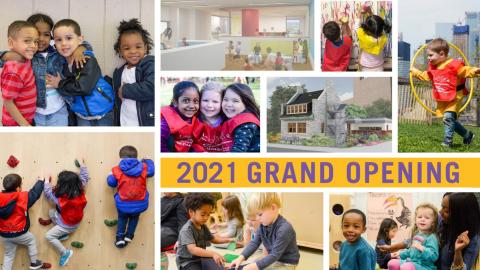
CAMPUS CHILD DEVELOPMENT CENTER
Officially Opens
Tuesday, September 7, 2021
Location: CCNY SCHIFF HOUSE
119 Convent Avenue New York, NY 10031
Full-time and Part-time schedules available
Questions and enrollment information, please contact the Child Development Center Director,
Chanda Huston at CHuston@ccny.cuny.edu
You can also connect with us on our website and social media:
Imagine Early Learning Centers Website
Imagine Early Learning Centers Facebook Page
Imagine Early Learning Centers Instagram(handle: @imagine_
elc)
Children Served & Hours
Serving children ages 2-5 years old with enrollment priority given to:
- CCNY Students
- CCNY Faculty/Staff
- Community families
*Subsidized tuition for qualifying CCNY students
Hours: Monday - Friday (7:30am - 5:30pm EST)
Philosophy
Imagine subscribes to a Developmental-Interaction philosophy of education, derived from various child developmental theories and research, suggesting that children develop skills and learn through hands-on experiences and peer interactions in an environment that is both stimulating and appropriately facilitated by nurturing, professional teachers. Children advance their development and learning through their natural curiosity and intrinsic motivation to explore and adapt to their environment. The Center administrative and teaching staff, working as partners with parents, encourage the children’s active participation in curriculum activities designed to facilitate learning through self-discovery and expression. Our goal is to develop the ‘whole child’ as a self-confident and expressive individual in cognitive, physical and social domains. Curriculum in our Toddler and Preschool classrooms reflects typical child development goals and the individual needs of each child in the group. Particular attention is paid in the final Pre-K year to Kindergarten preparedness, according to state learning standards. Children and parents alike are valued as individuals, as well as members of our diverse school community.
Programs
- Toddler
Our toddlers engage in free play and large motor activities as a group, as well as reading, painting, singing, dancing and circle time in more structured, small groups. Quiet/nap time is an important part of the day, giving each child a chance to unwind and recharge for the afternoon and evening. Teachers work with parents to help the children become more independent, including learning to use the bathroom.
- Pre-school
Preschoolers learn by exploring a stimulating environment organized into learning centers such as sensory and art, dramatic expression, block building, manipulative toys, math and science, literacy, media and quiet/relaxation. Children spend the day making choices of activities to participate in during free play periods, listening and contributing to large group circle time meetings and working together cooperatively in small, structured groups. Physical development is emphasized in outdoor play in parks and playgrounds and inside in organized games and classes. Kindergarten preparation emphasizes socialization and early reading, writing and problem-solving skills.
Daily Schedules
*Tentative
| TIME | ACTIVITY |
| 7:30 - 9:30 | Arrival/Choice Time |
| 9:30 - 10:00 | Snack (hand washing before/after) |
| 10:00 - 10:20 | Circle/Discussion Time |
| 10:20 - 11:00 | Structured Learning Time (learning centers), Small Group Activities |
| 11:00 - 12:00 | Outdoor/Gross Motor Play |
| 12:00 - 1:00 | Hand Washing, Lunch Prep, Lunch Time |
| 1:00 - 2:30 | Brushing Teeth, Nap/Rest Time, Quiet Activities |
| 2:30 - 3:00 | Children Awaken, Snack Time |
| 3:00 - 5:30 | Daily Recap, Choice Time, Dismissal |

